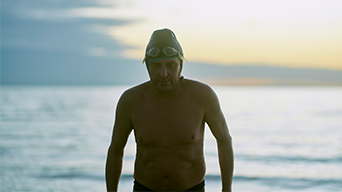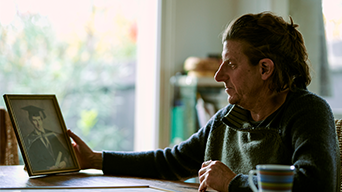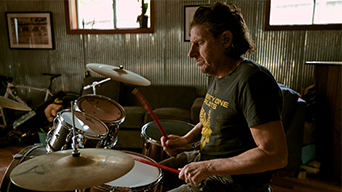“I’m a doctor, I shouldn’t get sick” – Geoff’s experience of work stress and depression
Despite spending decades helping others get better, Geoff’s greatest challenge was taking care of himself.
Geoff Toogood had always liked helping people. It was one of the main reasons he decided to become a doctor.
On graduating from medical school, he landed his first job as a junior doctor at a hospital.
What Geoff didn’t know at the time was that his profession would have a significant impact on his own mental health. That he would become great at helping others, but would struggle to take care of himself.
The realities of being a junior doctor
On the surface, Geoff was living out his dream. In reality, he felt under siege.
“The stresses and the hours were significant. Often we would work 48, 56 hours in a row without going home or getting much sleep. This was what my life was like for three or four years,” recalls Geoff.
“The world of medicine is very hierarchical. It’s stoic, it’s competitive. Refusing to show weakness and pushing on is a trait that’s admired,” says Geoff.
“At times, it can be an environment that cultivates mental health issues.”
Though he was struggling, Geoff didn’t tell anyone. This was the way things were in the medical profession. Long hours, little sleep, Geoff just accepted that it was all part of the deal. Doctors were there to help people. Their own health could wait.
Burning out but pushing on
Geoff did what many of his colleagues did – he simply put up with the stress. He started his training to become a cardiologist, a process that took eight years. During this time, he often thought about asking for support to manage his stress but never followed through.
Once his training was complete, Geoff jumped straight into a role as a consultant. It was full on, right away.
On reflection, Geoff concedes he was clearly burnt out.
“I had all the symptoms. I was getting angry and disassociated from my work. I didn’t want to do the work, I was desperate for a rest,” he says.
“I became very irritable when it came to noise. When I drove my car, it had to be in silence. I couldn’t listen to the radio. If I went to the football, music playing over the speakers or people talking nearby made me anxious and annoyed,” says Geoff.
During this period, Geoff’s found refuge in swimming. It was quiet in the water and he could block everything else out, focusing all of his attention on his next stroke, his next breath. But even then, he couldn’t fully escape.
“Sometimes I’d cry while I was swimming. My eyes would be red but people wouldn’t know why, because you can’t see tears beneath goggles.”
Confirming he wasn’t OK
Geoff had suspected he was depressed but couldn’t bring himself to say it aloud to another doctor. Not until he was sure. Instead, he visited the Beyond Blue website and looked up the symptoms of depression.
“I ticked every box. I took an online survey and it confirmed that I was significantly depressed and advised me to seek treatment.”
Geoff booked an appointment with his GP. Sitting in the waiting room, he started to worry that one of his patients might be there, and recognise him. He didn’t want them to think he couldn’t take care of himself. After all, he was the fixer. Not the one needing fixing.
When he was finally called into the GP’s office, Geoff didn’t know how to begin. He broke down in tears. Then he said exactly what he’d known all along.
“I need help.”
Road to recovery and reducing stigma
His visit to the GP brought an overwhelming sense of relief. Now that Geoff had acknowledged he wasn’t ok, he could focus on his recovery.
On the recommendation of his GP, Geoff made the time to work with a psychologist and a psychiatrist. In addition to therapy, he was prescribed medication and he finally took some time off work.
Geoff also began to practice mindfulness, though not in the way one might assume. Swimming had always had a meditative effect for Geoff and he found playing the drums offered a similar form of release.
“If I’ve had a stressful day, I might really belt the drums. It’s rhythmic, it’s repetitive and it keeps me in the moment.”
Geoff still plays the drums and gets into the water when he can – they remain key strategies for his wellbeing. His passion for helping others now extends beyond his work.
“The legacy I want to leave is a change in the way we deal with mental health of doctors and medical students,” says Geoff.
“I want the conversation to be routine so they can seek help in a very open way.”
The anxiety and depression test (K10) provides a simple measure of distress commonly used by Australian GPs and mental health professionals to determine what level of support you may require.
Crazysocks4docs is a charity Geoff founded which aims to break down stigma around mental health issues for those in the medical profession.
Photography by Good Grief Productions








